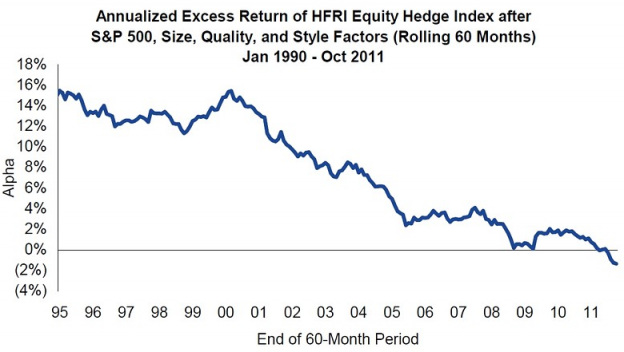Last week a report from Morgan Stanley documented the rising correlation of hedge fund returns with the overall equity markets and the decline in alpha those hedge funds generated. Mark Gongloff at MarketBeat writes:
For one thing, the correlation between hedge fund returns and the S&P 500 has risen to nearly 100% in the past couple of years, meaning the gap between hedge fund returns and pure market returns is vanishing rapidly.
You can see that in the chart we ran last week:

Doug Friedenberg writing at All About Alpha has an interesting take on what is going on here:
For the moment, it’s hard to explain such a close correlation with the S & P 500 unless funds have been gradually morphing into long-only funds. Which, ironically, may now be reasonably considered alternative investment strategies.
The problem for hedge fund investors is that they are getting index-like returns with a 2% management fee and 20% incentive fee. Despite that fact investors continue to pour money into hedge funds. This report shows that despite disappointment with their returns investors are still interested in putting more money to work in the hedge fund complex.
Maybe those investors are on to something. Maybe, just maybe, long-focused hedge funds are now a truly alternative investment, like they were back before the big money poured into the hedge fund complex seeking high returns with low correlations. Friedenberg continues:
High frequency trading accounts for 70 to 75% of trading volume. Hedge fund activity accounts for a meaningful portion of what’s left. If “alternative” investments are those outside the mainstream, then the antique investment strategy once called buy-and-hold is sufficiently in the minority that it must now be truly an alternative investment. Warren Buffett would probably be pleased to learn how innovative he’s become.
We thought this was a clever take on things. In part because it echoes our thoughts that good, old-fashioned stock picking would once again come back into favor once the obsessive focus on all things macro calmed down. Well that macro-focus has stayed front and center for far longer than any one has wanted or expected. It is therefore not altogether surprising that hedge funds have embraced a risk-averse, macro style focused on swapping one ETF for another. The hedging part of hedge funds is tough. Shorting is as Josh Brown says a “blood sport.”
This would of course require a change in thinking for hedge funds. In an age of high frequency trading looking out over a multi-year horizon seems downright old fashioned. That and the fact that picking stocks, long and short, is tough work. Just ask Whitney Tilson who has seen his very public stock picks get whipsawed. Then again nothing good comes easy in the financial markets. The only question is what managers will be able to make that transition when stock correlations no longer approach unity.
Items mentioned above:
Hedge funds kiss their alpha goodbye. (MarketBeat)
Investors just can’t quit hedge funds. (Deal Journal)
Introducing the new 2 and 20 index funds. (All About Alpha)
[earlier] The forthcoming golden age of stock picking. (Abnormal Returns)
Shorting is a bloodsport. (The Reformed Broker)
Netflix stock sale is irritating. (Deal Journal)
[earlier] Rising stock correlations, this too shall pass. (Abnormal Returns)








